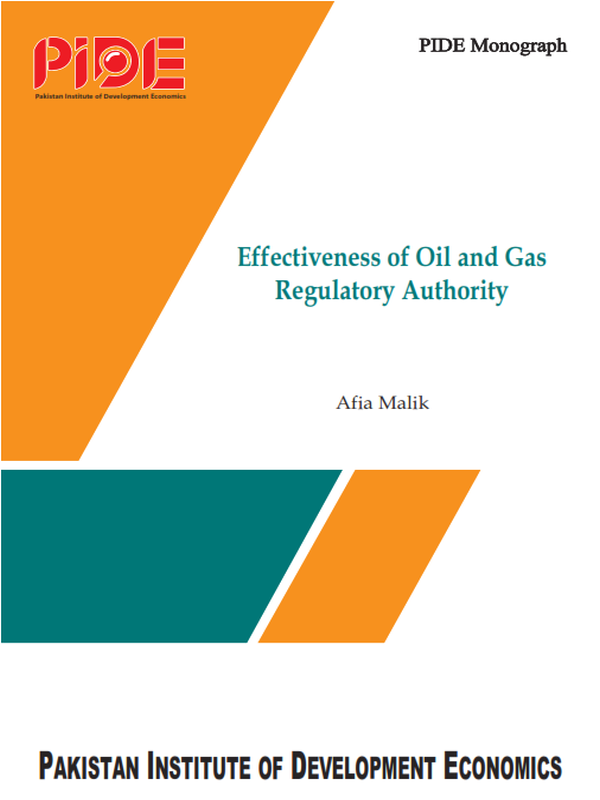Effectiveness of Oil and Gas Regulatory Authority
Publication Year : 2022
Author: Afia Malik
Explore More : Monograph Series
EXECUTIVE SUMMARY
OGRA was established on March 28, 2002, via the Oil and Gas Regulatory Authority Ordinance (2002) to regulate the midstream and downstream oil and gas sector. The objective behind establishing OGRA was to foster competition, increase private investment and ownership in the midstream and downstream petroleum industry, protect the public interest while respecting individual rights and provide effective and efficient regulations. This report evaluates the effectiveness of OGRA. It covers the quality of work done and the level of performance at OGRA.
KEY FINDINGS
-
- Since its inception in March 2002, the Authority has put a regulatory framework in the form of rules, regulations, and technical standards. In preparing the regulatory framework in OGRA’s 20-year history, frequent delays can be observed.
- Apart from issuing licenses, there is no effective role of OGRA in regulating oil and gas sector prices. The Authority is only computing prices based on already set parameters by the government. The enforcement mechanism of performance standards is weak.
- OGRA is financially independent, yet regulatory independence is compromised by law in its functions. Likewise, provisions in the OGRA law have curbed transparency in decision-making and limited public participation in the decision-making process. Above all, non-clarity in parental law is not allowing the regulatory Authority to improve its regulatory capacity.
- There is no evidence to suggest a proactive role of OGRA in the sector. The role of OGRA in effectively determining the level of competition in the oil sector is also vague.
- OGRA submits an Annual Report on its affairs and a State of the Petroleum Industry Report for that financial year. But evaluation of these reports has never been undertaken.
- OGRA governing body is the ‘Authority’, comprising a chairman and three members. The ‘Authority’ is statutorily empowered to approve or disapprove any decisions relating to OGRA functions. Currently, OGRA is working in a centralised manner. The regulatory decision-making and all the policymaking related to organisational affairs are at the level of the ‘Authority’.
- Effective regulatory capacity demands a strong, well-qualified, and experienced governing body. OGRA, with time, has been able to find personnel (only in the governing body) that satisfies the criteria. However, disproportionate interference of law enforcement agencies in the Authority’s affairs has indirectly undermined decision-making capability and regulatory capacity.
- OGRA, at present, is de jure and de facto politically independent in its human resource management. Yet, the lack of human resource development and deficiency in the dedicated workforce combined with disjointed departmental activities is hurting the organisation’s overall capacity. As a result, routine activities get delayed, and the performance of regulatory duties is affected.
WAY FORWARD
- Amendments in the law can take care of some of the regulatory challenges at OGRA.
- Before issuing rules and regulations, OGRA should implement a clear and transparent consultation and public participation policy.
- More information and communication technologies are recommended for transparency, minimising delays, and improving departmental coordination.
- There is an urgent need to simplify regulatory processes and enhance federal government and OGRA coordination.
- For effective accountability of the regulator, OGRA reports (Annual and State of the Petroleum Industry) must be evaluated by independent experts regularly.
- Where a regular oversight of the performance of the governing body of OGRA is necessary, equally important is a chairman, any member, or any officer must not feel insecure about their positions and in taking tough decisions. In other words, an ability of a regulator to take independent decisions free from the influence of government, free from the fear of NAB or the Judiciary.
- OGRA should allocate adequate human and financial resources (in line with their tasks) to ensure operational independence. Insufficient resources may put the regulators’ independence at risk and impact its effectiveness.
- The monitoring and enforcement department needs to be strengthened and redefined.
- Decentralising decision-making powers for effective and speedy decisions in routine matters is suggested.
For Full Text Download PDF
© 2024 Pakistan Institute of Development Economics




